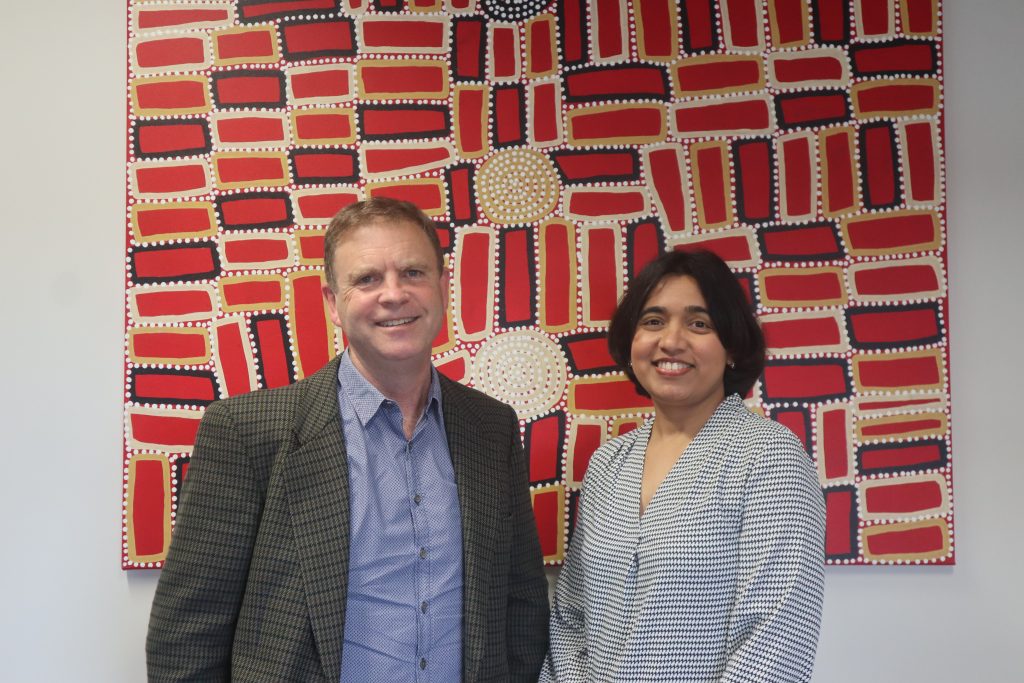Bridging the gap to support groundbreaking RNA treatments
Co-ordinated by NSW based organisations, the BRIDGE program is a pioneering initiative aimed at advancing Australian RNA research capabilities and taking new treatments from bench to bedside.
Research exploring how cancer, autoimmune conditions and infectious diseases can be treated using RNA technology, has expanded since the rapid development of vaccines for the COVID-19 pandemic. To support this growing field, the BRIDGE Program – short for ‘Bringing RNA Innovations through the Developmental Gap Effectively’ – was established. The Program is co-ordinated by the Kirby Institute, UNSW Sydney, and receives support from the Office for Health and Medical Research (OHMR).

Supporting new RNA-based therapeutics
OHMR is helping to build an innovative and highly skilled workforce to explore, develop and manufacture RNA-based technologies. This support is provided through initiatives including the RNA Future Leaders Program, Early-Mid Career grants for researchers and the NSW Health Commercialisation Training Program. OHMR provides policy and project support and an expert who sits on the BRIDGE consortium committee.
Collaborating and closing gaps
The BRIDGE program, open to all Australian researchers working on promising RNA-based treatments, brings together and co-ordinates existing RNA therapeutics infrastructure, including the RNA Production and Research Network. Through a structured pipeline, BRIDGE aims to take RNA molecules with therapeutic potential from laboratory-based proof-of-concept stage to clinical trials and commercialisation.
Scientia Professor Anthony Kelleher is Director of the Kirby Institute and leads the BRIDGE program. Kelleher is a clinician scientist, clinical immunologist and immunopathologist with internationally renowned expertise in HIV and COVID-19 research. Kelleher is currently developing RNA molecules to treat coronavirus infections:
What is the BRIDGE program?
“The aim of the program is to accelerate the development of RNA-based therapeutics from pre-clinical stages to clinical trials. RNA-based treatments include mRNA therapies, which instruct cells to produce specific proteins to treat diseases or prevent infections. They also include siRNAs (small interfering RNA), which can silence targeted genes. These technologies are gaining significant interest due to their precision and versatility in targeting diseases at the genetic level. Plus, advances in RNA manufacturing and delivery have made them even more scalable.”
How is the program supporting RNA research?
“BRIDGE is all about closing the gap between groundbreaking research and real-world medical advances, helping new therapeutics make it to market. We are focused on identifying, supporting, and partnering with, promising RNA-based projects to develop advanced therapeutics, such as new ways to control or prevent infections. Our goal is to connect these initiatives to an accessible, collaborative network for Australian researchers, making it easier to transition from research to real-world application. To do that, we’re building strong partnerships with academic institutions, industry experts, government bodies, and community representatives. We even have a consumer representative who provides invaluable feedback on patient needs, perspectives, and optimal outcomes.”
Who does the BRIDGE program collaborate with?
“Our network involves a diverse group of not-for-profit partners. It brings together the Kirby Institute, Medicines Development for Global Health, Scientia Clinical Trial Research, the Garvan Institute for Medical Research and UNSW RNA Institute, OHMR and Office of the Chief Scientist and Engineer, along with community representatives on our Clinical Development Advisory Committee.”
What does the Kirby Institute bring to BRIDGE?
“The Kirby Institute brings a deep understanding of infectious diseases, from a molecular to a population level. Our expertise spans translation and laboratory research, immunobiology, and clinical trials, particularly in areas like bloodborne viruses and respiratory pathogens. With strong ties to medical research organisations and extensive experience in epidemiology, surveillance, and biostatistics, we offer a comprehensive approach to tackling infectious diseases. We are strongly committed to equity in healthcare and want all people to have access to RNA treatments in Australia and globally. This commitment is reflected in our ongoing projects in countries like Papua New Guinea, Indonesia, Thailand and the Pacific Islands.”
Supporting researchers throughout the pipeline
Dr Minal Dalvi, is a Senior Clinical Research Manager at the Kirby Institute and Chief Operations Officer for BRIDGE. As a qualified patent attorney with a PhD in Immunology, her background helps her to oversee strategic operations, partnerships, and the execution of BRIDGE initiatives. Her work aims to accelerate the development and commercialisation of innovative RNA-based therapies:
What kind of roadblocks do researchers identify?
“After conducting lab research and testing, researchers often report feeling out of their depth when taking next steps towards commercialisation of their product. The BRIDGE program aims to close this gap. We want to be like a one-stop-shop for researchers, connecting them with experts, information and potential partners, supporting them to get their product to clinical trials and then to market. Issues such as toxicology testing and capacity for upscaling can often create problems in later stages of research so we try to identify potential problems as early as possible so they can be addressed.”
What are the next steps for BRIDGE?
“When supporting RNA studies, staff from the BRIDGE program will assist researchers to create a bespoke drug development plan. Where possible, we will collaborate with the RNA Production and Research Network to progress each project. We’re focusing on RNA-based treatments at proof-of-principle stage, with strong commercial potential in both high-income and low-and middle-income countries, ensuring equal access to therapies and vaccines. Prospective collaborators and clinicians interested in an initial discussion, can reach out to us directly at BRIDGE@kirby.unsw.edu.au.”
Updated 5 months ago